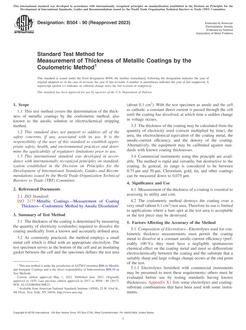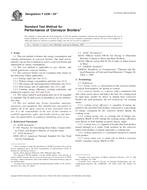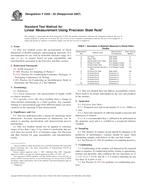1.1 These test methods include descriptions for conducting and reporting throughput and electrical power tests on mechanical conveying equipment for municipal solid waste and recovered products from resource recovery systems. Other aspects of performance testing such as spillage, conveyor tracking, dusting, slippage, transfer points, etc., should be considered in the interpretation of the results. These test methods can be used on equipment handling raw refuse, processed refuse, magnetic scrap metals, nonferrous scrap metals, mixed glass, and residues or tailings. These test methods may also be used for materials in other industries.
1.2 These test methods cover mechanical conveying equipment including apron, belt, drag, flight, screw, slat, and vibrating conveyors and bucket elevators.
1.3 These test methods are applicable specifically to the resource recovery industry since municipal solid wastes are heterogeneous mixtures and the composition and bulk densities vary considerably depending on many factors. Because of the varying composition of municipal solid waste, a number of samples must be taken to determine accurately the performance of the mechanical conveying equipment.
1.4 Test methods for determining the approximate as-conveyed bulk density of the material and for determining the electrical horsepower input of the equipment motors are also included.
1.5 It is intended that the tests be made and reported by personnel trained in the proper application and use of the various instruments and methods involved.
1.6 The values stated in SI units are to be regarded as the standard. The values given in parentheses are for information only.
This standard does not purport to address all of the safety concerns, if any, associated with its use. It is the responsibility of the user of this standard to establish appropriate safety and health practices and determine the applicability of regulatory limitations prior to use.
Product Details
- Published:
- 02/01/2005
- Number of Pages:
- 5
- File Size:
- 1 file , 100 KB


